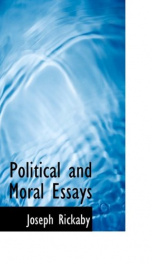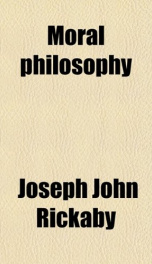political and moral essays

Purchase of this book includes free trial access to www.million-books.com where you can read more than a million books for free. This is an OCR edition with typos. Excerpt from book: ESSAY IV THE CATHOLIC DOCTRINE OF LYING AND EQUIVOCATION There is a question often put, and probably never answered in the negative: ' Can you keep a secret ?' No woman certainly ever avowed that she could not. We all profess to know how to keep secrets: we all profess likewise to speak the truth: yet how to keep a secret in the face of an impertinent questioner, and still tell no lie to put him off, is a delicate moral operation that baffles many people's skill. There is one rough way of doing it, which I suppose is the common way. It begins by assuming that the essence of a lie consists in a violation of the hearer's right to the truth. Then the consequence is drawn, that where an enquirer has no right to know the truth about which he enquires, and an untruth is necessary to keep the truth from him, there an untruth may be told which will be no lie. " If all killing be not murder," demands Milton, " nor all taking of another man's property stealing, why should all untruths be lies ?" I will not callthis doctrine un-Catholic, held as it is by many loyal children of the Church, but I submit that it is unphilosophical, and may be brought to bear bitter fruit in theology. For if truthfulness is a matter of strict justice and the hearer's right, and we have, as the best theologians teach, no strict rights against our Creator, where is the guarantee of the truthfulness of God in revelation ? Another way, amusingly described by Cardinal Newman, is the way of those who will have it through thick and thin, that all lies and untruths, and all manner of equivocation and lack of sincerity in speech, are radically wrong, extremely wrong and shameful; still that a man would not be man, if he did not tell a lie now and then at a hard pinch; and that the best thing he can do is to com... --This text refers to an alternate Paperback edition.
Info about the book
Author:
Series:
Unknown
ISBN:
0865970564
Rating:
5/5 (3)Your rating:
0/5
Languge:
English
Users who have this book
Users who want this book
What readers are saying
What do you think? Write your own comment on this book!
write a commentGenre
if you like political and moral essays try:
Other books by this author
Do you want to read a book that interests you? It’s EASY!
Create an account and send a request for reading to other users on the Webpage of the book!




